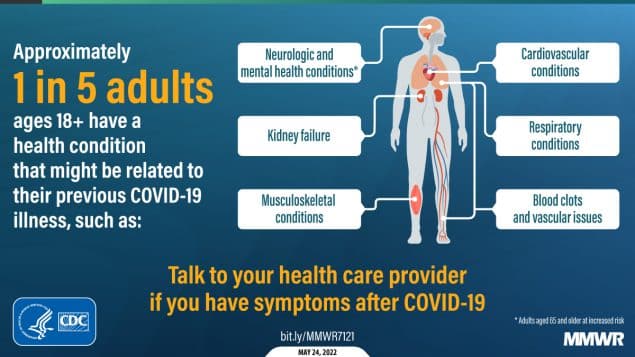Long COVID, also known as post-COVID syndrome or COVID-19 long haulers, refers to the ongoing symptoms and health issues experienced by some individuals after recovering from COVID-19. These symptoms can range from fatigue and brain fog to difficulty breathing and cardiovascular issues.
One group that may be particularly vulnerable to long COVID, are individuals with preexisting respiratory conditions, such as asthma or chronic obstructive pulmonary disease (COPD). These conditions can make it more difficult for individuals to recover from COVID-19 and may also exacerbate the symptoms of long COVID.
Individuals with preexisting respiratory conditions need to take extra precautions to prevent contracting COVID-19 and to seek medical attention if they do become infected. It is also essential for healthcare providers to be aware of the potential for long COVID in these patients and to provide appropriate care and support.
In this blog post, we will delve deeper into long COVID and its potential impact on individuals with preexisting respiratory conditions. We will explore the symptoms, risk factors, and management strategies for this subset of patients. By understanding the unique challenges and needs of this population, we can work towards improving outcomes and quality of life for those affected by long COVID.
What is Long Covid?
Long COVID, also known as post-COVID syndrome or COVID-19 long haulers, refers to the ongoing symptoms and health issues experienced by some individuals after recovering from COVID-19. These symptoms can range from fatigue and brain fog to difficulty breathing and cardiovascular issues.
How Common is Long COVID?
The exact prevalence of long COVID is not yet known, as it is a relatively new phenomenon and research is ongoing.
However, estimates suggest that a significant portion of individuals who have had COVID-19 may be affected by long COVID.
A study in the United Kingdom found that approximately 10% of individuals who had COVID-19 experienced ongoing symptoms for at least 12 weeks after the initial infection.
Other studies have suggested that the prevalence may be even higher, with some estimates as high as 40%.
How can long COVID affect individuals with preexisting respiratory conditions?
One group that may be particularly vulnerable to long COVID is individuals with preexisting respiratory conditions, such as asthma or chronic obstructive pulmonary disease (COPD). These conditions can make it more difficult for individuals to recover from COVID-19 and may also exacerbate the symptoms of long COVID.
Examples of symptoms that may be more severe or longer-lasting in individuals with preexisting respiratory conditions include:
- Difficulty breathing or shortness of breath
- Persistent cough
- Chest pain or tightness
- Wheezing or a whistling sound when breathing
- Fatigue
- Brain fog or difficulty concentrating
- Loss of sense of smell or taste
- Depression or anxiety
The impact of long COVID on daily life and quality of life for individuals with preexisting respiratory conditions can be significant.
Ongoing symptoms can make it difficult for these individuals to engage in activities that they normally enjoy, such as exercising or socializing with friends and family. They may also have difficulty working or performing other daily tasks.
In addition, long COVID can hurt mental health, leading to feelings of isolation and frustration. Individuals with preexisting respiratory conditions need to seek support from loved ones and healthcare providers to help manage the physical and emotional challenges of long COVID.
Managing long COVID for individuals with preexisting respiratory conditions
For individuals with preexisting respiratory conditions, such as chronic obstructive pulmonary disease (COPD) or asthma, long COVID can be particularly challenging.
These conditions can make it more difficult for individuals to recover from COVID-19 and may also exacerbate the symptoms of long COVID.
If you have a preexisting respiratory condition and are experiencing long COVID, it is important to take steps to manage your symptoms and prioritize self-care.
Here are some tips for symptom management and self-care:
- Follow your usual treatment plan: It is important to continue taking your regular medications and following your usual treatment plan as prescribed by your healthcare provider. This can help to manage your symptoms and prevent flare-ups of your underlying respiratory condition.
- Get plenty of rest: Fatigue is a common symptom of long COVID, so it is important to get enough sleep and rest to help your body recover.
- Stay hydrated: Drinking plenty of fluids can help to reduce fatigue and other symptoms.
- Eat a healthy diet: A balanced diet rich in fruits, vegetables, and protein can help to boost your immune system and support your overall health.
- Exercise regularly: Regular physical activity can help to reduce fatigue and improve overall well-being. Be sure to consult with your healthcare provider before starting a new exercise routine.
Medications and oxygen therapy may also help manage long COVID symptoms in individuals with preexisting respiratory conditions. Your healthcare provider will be able to recommend the most appropriate treatment for your individual needs.
It is also important to follow up with your healthcare provider regularly to track your progress and make any necessary adjustments to your treatment plan. Your healthcare provider can also provide support and guidance for managing your symptoms and improving your overall health.
Getting support for long COVID
The challenges of long COVID can take a toll on mental health, leading to feelings of isolation, frustration, and even depression. Individuals with preexisting respiratory conditions need to prioritize their mental health and seek support as needed. Here are some tips for finding mental health support:
- Seek support from loved ones: Sharing your feelings and struggles with trusted friends and family members can provide a sense of connection and support.
- Join a support group: There are many online and in-person support groups for individuals with long COVID and preexisting respiratory conditions. These groups can provide a sense of community and a safe space to share your experiences and get support from others who understand what you are going through.
- Consider therapy: Talking to a mental health professional, such as a therapist or counselor, can be a helpful way to process your emotions and cope with the challenges of long COVID.
- Explore online resources: There are many online resources available for finding mental health support, including blogs, podcasts, and social media groups. These resources can provide information and support from the comfort of your own home.
Here are some resources for finding support in the United States:
- The Long Hauler Support Group: This online support group is open to anyone in the United States who is experiencing long COVID or post-COVID syndrome.
- Asthma and Allergy Foundation of America (AAFA): AAFA offers resources and support for individuals with asthma, including a helpline and support groups.
- COPD Foundation: ,The COPD Foundation offers resources and support for individuals with COPD, including a helpline and support groups.
- The CDC is an excellent resource for up to date information regarding COVID, Long COVID and related information

Conclusion
Long COVID can be a difficult and distressing condition for individuals with preexisting respiratory conditions. However, with proper symptom management and self-care, and by seeking out support and resources as needed, it is possible to improve quality of life and manage the challenges of long COVID. If you are coping with long COVID and have a preexisting respiratory condition, don’t hesitate to reach out for support and take advantage of available resources.





